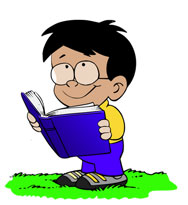Define 'read'
Let's start by considering the dubious use of the word 'read' in this application.As youngsters we are taught to read and write English in school. At some point around the ages of six or eight the job is more or less completed. Of course integrating technical, industrial, medical and professional terms is a life-long process, but once we can read, we can read. A logical assumption then is that once a person can read music, they can read music, and as usual with assumptions, this one just causes confusion.
Unlike learning to regale tales of Dick and Jane, there are many degrees or altitudes of being able to read music, for example:
- from getting most of the words right the first time through, to being able to correctly sight-sing a piece given only the starting note;
- from being able to name the notes on the staff with regards to 'everyone of those good boys that did fine', to knowing how to decipher music written for treble instruments and bass instruments and the all instruments in between;
- from being able to follow a melody line, to interpreting an orchestral score.


Previous Page

